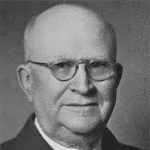Quotes about Testimony
In our manner of speech, our plans of living, our dealings with others, our conduct and walk in the church and out of it – all should be done as becomes the gospel (Phil. 1:27).
Precepts instruct us what things are our duty, but examples assure us that they are possible… When we see men like ourselves, who are united to frail flesh and in the same condition with us, to command their passions, to overcome the most glorious and glittering temptations, we are encouraged in our spiritual warfare.
A Puritan Golden Treasury, compiled by I.D.E. Thomas, by permission of Banner of Truth, Carlisle, PA. 2000, p. 95.
The man who lives right, and is right, has more power in his silence than another has by his words.
It is for us, in whom the Christian Church is at this moment partially embodied, to declare that Christianity, that the Christian faith can do that for the world which the world needs. You say, “What can I do?” You can furnish one Christian life. You can furnish a life so faithful to every duty, so ready for every service, so determined not to commit every sin, that the great Christian Church shall be the stronger for your living in it, and the problem of the world be answered, and a certain great peace come into this poor, perplexed phase of our humanity as it sees that new revelation of what Christianity is.
Testimony is, of course, popular in our postmodern, that’s-good-for-you age. Who would object to your thinking you’ve gotten something good from Christ? But wait and see what happens when you try to move the conversation from what Jesus has done for you to the facts of the life, death, and resurrection of Christ, and how that all applies to your nonbelieving friend. That’s when you discover that testimony is not necessarily evangelism.
There is a language in actions. And in some cases the language of action is much more clear and convincing than words.
Distinguishing Marks of a Work of the Spirit of God, 1741. Modern language courtesy of Archie Parrish, The Spirit of Revival, 2000, p. 70.
Whenever I hear anything spoken in conversation of any person, if I think it would be praiseworthy in me, Resolved to endeavor to imitate it. July 8, 1723.
The Word of God is the principle means by which other means operate and are made effectual… For all that is visible to the eye is vague and vain without the Word of God to instruct and guide the mind. It is the Word of God that is indeed held forth and applied by example, just as the word of the Lord sounded forth to other towns of Macedonia and Achaia by the example of those who believed in Thessalonica.
Distinguishing Marks of a Work of the Spirit of God, 1741. Modern language courtesy of Archie Parrish, The Spirit of Revival, Crossway Books, 2000, p. 71.
Someone has said that more is learned from what is “caught” that “taught”… Though it is certainly important to communicate God’s Word didactically, it’s what people see in our lives that gives weight to our words. That is why the qualifications for elders are so important. If we are to “teach the Word of God” effectively, we must simultaneously “live the Word of God.”
Elders and Leaders, Moody, 2003, p. 267. Get this book!
God knows His own. It is well that He does, for sometimes it would be difficult for us to determine who are His!
Christians are often persecuted not for their Christianity, but for their lack of it. Sometimes they simply have unpleasant personalities. They are rude, insensitive, thoughtless – piously obnoxious. Some are rejected because they are discerned as proud and judgmental. Others are disliked because they are lazy and irresponsible. Either arrogance or incompetence mixed with piety is sure to bring rejection.
The Sermon on the Level by Kent Hughes taken from Luke by Kent Hughes – Volume 1, copyright 1998, Crossway Books, a division of Good News Publishers, Wheaton Illinois 60187, www.crosswaybooks.org, page 221.
If lips and life do not agree, the testimony will not amount to much.
You are the only Bible some unbelievers will ever read, and your life is under scrutiny every day. What do others learn from you? Do they see an accurate picture of your God?
The Greek word translated “example” is tupos, which means model, image, or pattern… When you set an example, you are giving people a pattern to follow. Someone once said, “Your life speaks so loud I can’t hear what you say.” Your lifestyle is your most powerful message.
The world takes its notions of God, most of all, from the people who say that they belong to God’s family. They read us a great deal more than they read the Bible. They see us; they only hear about Jesus Christ.
A man ought to live so that everybody knows he is a Christian…and most of all, his family ought to know.
A holy life will make the deepest impression. Lighthouses blow no horns; they just shine.
God has no more precious gift to a church or an age than a man who lives as an embodiment of his will, and inspires those around him with the faith of what grace can do.
The virtue of a man ought to be measured, not by his extra-ordinary exertions, but by his everyday conduct.
But depend on it, bad company in this life, is the sure way to procure worse company in the life to come.
You must remember we are all creatures of imitation: precept may teach us, but it is example that draws us. There is that in us all, that we are always disposed to catch the ways of those with whom we live; and the more we like them, the stronger does the disposition grow. Without our being aware of it, they influence our tastes and opinions; we gradually give up what they dislike, and take up what they like, in order to become closer friends with them. And, worst of all, we catch their ways in things that are wrong far quicker than in things that are right. Health, unhappily, is not contagious, but disease is. It is far easier to catch a chill than to impart a warmth; and to make each other’s religion dwindle away, than grow and prosper.
Since we can’t see Jesus for the day-to-day living, God has provided in our lives godly men and women whom we can watch, question and follow within the church. Let’s remember, this is a team race. We need examples to imitate. Mavericks in the church only hurt themselves and others. To say you don’t need human examples is prideful and clearly unbiblical (1 Cor. 4:16; 1:11; Phil. 3:17; 4:9; Heb. 13:7; 1 Pet. 5:2).
A man’s life is always more forcible than his speech. When men take stock of him they reckon his deeds as dollars and his words as pennies. If his life and doctrine disagree the mass of onlookers accept his practice and reject his preaching.
Holy Mr. Whitefield, when someone observed, "I should like to hear your dying testimony," said, “No, I shall in all probability bear no dying testimony." "Why not?" said the other. "Because I am bearing testimony every day while I live, and there will be the less need of it when I die."
The course of thy life will speak more for thee than the discourse of thy lips.
Throughout the world, in nation after nation, men and women have died for their Christian faith. The very least we can do is live for our faith.
Apart from faith in Christ, there is no explanation for such a life.
If you are a Christian, you can expect folks to criticize, but you ought to live so nobody will believe them.


















